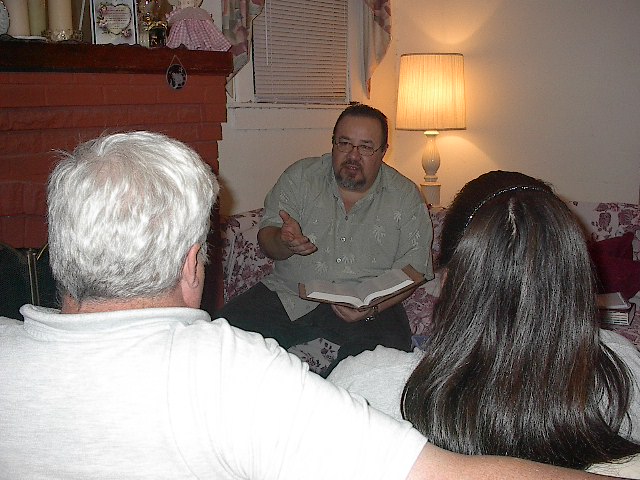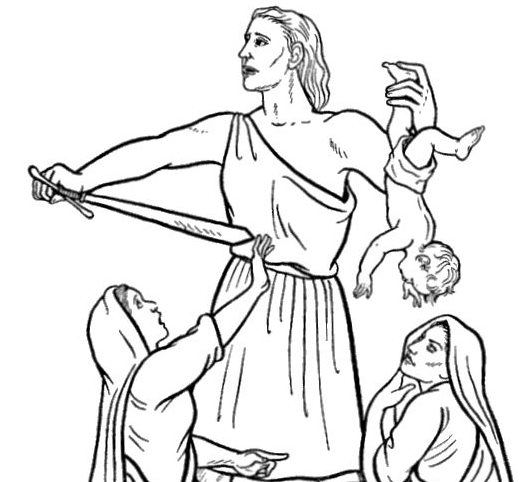 First Kings 3:16-28, tells a story of two women who came before King Solomon. Each was claiming that a certain baby was theirs. What had happened, was that one of the women accidently killed her baby by rolling over on it during the night. When she awoke and saw what she has done, she went and exchanged her dead baby with a living one of another woman. When the other mother realized what happened, she search for and found her baby in the custody of the other. The situation grew to the point it was brought before King Solomon. He listened to both sides, then he gave his counsel. He ordered the baby be cut in half and for each woman to get half. The real mother cried out begging the king not to kill the baby, but instead to give it to the other woman.
First Kings 3:16-28, tells a story of two women who came before King Solomon. Each was claiming that a certain baby was theirs. What had happened, was that one of the women accidently killed her baby by rolling over on it during the night. When she awoke and saw what she has done, she went and exchanged her dead baby with a living one of another woman. When the other mother realized what happened, she search for and found her baby in the custody of the other. The situation grew to the point it was brought before King Solomon. He listened to both sides, then he gave his counsel. He ordered the baby be cut in half and for each woman to get half. The real mother cried out begging the king not to kill the baby, but instead to give it to the other woman.
Earlier, King Solomon was approached by God, in a dream, and offered the opportunity to choose any blessing he might want. Instead of riches, a long life, or other similar possibilities, instead Solomon said in 1st Kings 3:9 (NASB) “Give Your servant an understanding heart to judge Your people to discern between good and evil. For who is able to judge this great people of Yours?” Even at his age, he was young at the time, he understood that he needed God’s wisdom to lead the people as a king. Christian counselor are in the same boat, as it were, they are also in need of God’s wisdom for counseling the people He sends the counselors. And, while it is true God promised Solomon that no other person would ever compare to him in his wisdom, God does promise to give wisdom to those who ask for it.
Though James (1:5-7) does promise wisdom for those who ask for it, He also places a condition on getting it, (v.6, NASB) “But he must ask in faith without any doubting…” Doubt is the opposite of Faith. Faith places certain conditions on the believers as well. Hebrews 11:1 (KJV) says, “Now faith is the substance of things hoped for, the evidence of things not seen.” Notice the key words here, “substance” and “evidence.” These two words imply something that can be checked and corroborated. I can hope I will win the lottery, but that in no way proves I actually might win. On the other hand, I can hope to get rich, save money, invest it wisely, and have actual “evidence” of a chance of achieving my goal. In other words, “evidence of things not seen.”
Solomon understood that because he was young, his immaturity could cause him problems. He had lived under his father king David (a man after God’s own heart), and had seen him fail miserably. He understood that just believing in God was not enough to help someone make wise decisions. There was something else needed, and it was something not already available to people without God’s help. As counselors, we must also come to the same understanding. There will be many occasions where we will have a situation brought to us to “judge.” Yes, I said judge. Before you can offer your wise counsel to a person, regarding the circumstances they present to you as their problem, you must make a judgment as to the truth.
 As you may know, much of what people present to a counselor is better known as symptoms. These symptoms are the result of the perceived problem by the client. Remember, people do what they do, because they believe what they believe. Therefore, they make decisions based on what they believe to be the problem. In reality, most of these perceived problems of clients are actually their reactions to false and incorrect beliefs. The number one reason most people have “problems” in relationships, especially, is that they are believing some lies. These lies have either been a part of their lives for so long, or the lies are mixed in with truths to the point, that the persons believe they are all the truth. Some people, like the woman who accidently killed her baby, will stick to their lies to the point that they would rather lose everything than to admit they are lying. Those people would hurt others, rather than to admit the truth and find a solution.
As you may know, much of what people present to a counselor is better known as symptoms. These symptoms are the result of the perceived problem by the client. Remember, people do what they do, because they believe what they believe. Therefore, they make decisions based on what they believe to be the problem. In reality, most of these perceived problems of clients are actually their reactions to false and incorrect beliefs. The number one reason most people have “problems” in relationships, especially, is that they are believing some lies. These lies have either been a part of their lives for so long, or the lies are mixed in with truths to the point, that the persons believe they are all the truth. Some people, like the woman who accidently killed her baby, will stick to their lies to the point that they would rather lose everything than to admit they are lying. Those people would hurt others, rather than to admit the truth and find a solution.
To be able to discern this, a Christian counselor must learn to judge carefully. Do not be afraid of judging, and stop believing the lie that the Scriptures call on us to not judge others. Notice the following from Matthew 7:1 (KJV). “Judge not, that ye be not judged.” Most people read this verse and stop here. So, they will argue that the Bible instructs believers not to judge others. But, Matthew 12:33 (NASB) says, “Either make the tree good, and its fruit good; or make the tree bad, and its fruit bad; for the tree is known by its fruit.” See, a tree is known by its fruit. This means you have to look at the fruit to make a judgment as to the kind of tree. For example, if we look up into a tree and see oranges hanging there, do we then say, “Hey, look, it’s a lemon tree?” Of course not, we see the fruit, judge that they are oranges, and know the type of tree immediately. And, please do not say that you don’t understand that the Lord (who is the One quoted) is actually speaking of people and their ways. Yes, we are expected to judge, but we are expected to leave the judgments which belong to God in His hands. Our need to judge is so that we can make good and correct decisions. We are not allowed to judge the sins of others, this is God’s prerogative alone. Notice also in Matthew 7:2 (KJV), “For with what judgment ye judge, ye shall be judged: and with what measure ye mete, it shall be measured to you again.” If we are willing to be judged in the same manner we judge others, then we can go ahead and make the judgment.
As counselors, we are to make judgments regarding the actions, behavior and decisions of our clients. These judgments are important so that we may better discern the real problem, and therefore be better able to help people. When we are, inevitably, presented with a situation which will be as difficult as the one King Solomon was, we must be prepared to make the right judgment. The “right” judgment will, also inevitably, need to be the one that God wants. For you, as a Christian counselor, this means working your way through the lies which have trapped the client in a life of problem, and identifying the truth which will “make them free.” To be successful at this, the Christian counselor must learn to make careful judgments.
You may not like the analogy I am about to use, but Christian counselors are much like judges. May times couples come before a counselor, not with the intention of finding a solution, but instead with the desire that the counselor will “judge” that they are right and that their partner is wrong. Counselors tend to reject this expectation, but they still have to judge the truth, which sometimes does mean judging one right and one wrong. Without this judgment, the Christian counselor will fail to arrive at the truth. And, it is the truth, not the honest intentions of the counselor, which will help find the correct resolution to the problems presented. It may feel uncomfortable to make these judgments, but the Christian counselor is expected to follow the leading of the Holy Spirit, which leads us into all truth (John 16:13).
Just as with King Solomon you are going to encounter those situations where one person is clearly wrong, but you also do not want to be seen as choosing sides. So you will have to use the “cut the baby in half” test. For example, let’s say you have in your counseling office a couple. The husband committed adultery and the wife is there, with him, trying to see if you can help her decide her options. She could choose to try to work things out, or she could just go for the divorce. This means you will have to help her by causing something to happen which will be obvious to her. In this example, you ask the wife to consider separating from her husband for three to six months, while he makes some character changes. You are actually suggesting something that will challenges both persons. In his case, the question is will he show that he wants to save his marriage by doing whatever it takes, or will he argue that the consequences should not be so hard on him. If he argues, he is like the woman who stole the child. He won’t care that he is still hurting his wife and marriage, he just wants things to be the way he thinks they should.
In the wife’s case, the test is to see if she actually wants change in him, or just to punish him for being bad. In the former, the goal will be that she imposes these consequences on her husband, because where there are no consequences, there is permission. On the latter, just punishing her husband will serve little value other than making feel slightly better at the moment. In either case, husband or wife, they will either see the benefit of making those personal changes and ending up with a healthier and happier marriage, or they will be so angry and self-centered that they don’t care of the long term damage to their relationship.
 As a counselor, you will be confronted with the “cut the baby in half” situations, much more than you might anticipate. Sometimes the situation will seem much less drastic, as compared to an affair. For example, you have a client who seems to struggle with doing what you are counseling him to do. You can “test” him by giving him some homework which should not be hard to do, and can be done easily in one week’s time. If the person does the homework, you can be more confident that he will also take future steps you may counsel. If he makes excuses why he did not get the homework done, then you know you’re wasting your time with someone who is playing at wanting to change. King Solomon could have listened to the women’s arguments and pleadings all day long, and might never be able to figure out who was telling the truth, and who was lying. By threatening to cut the baby in half (the test) he knew that the real mother would not want that to happen. He knew that somehow she would show that she was the real mother. In this case, the real mother would rather give her child away, than allow the baby to be killed. King Solomon’s wisdom was such that he knew that testing people was quicker than just listing to tons of words. Christian counselors should learn this aspect of counseling. We are judges. We have to make judgments on a regular basis. The goal must be to make the best, fair, and most impartial judgments possible. To do this, we need that wisdom from God. And, besides just asking God to give us wisdom (which is fine, but, in my own opinion, the lazy way to get it), we are to study the Word of God, take it to heart and memory, and use it when we make those judgments.
As a counselor, you will be confronted with the “cut the baby in half” situations, much more than you might anticipate. Sometimes the situation will seem much less drastic, as compared to an affair. For example, you have a client who seems to struggle with doing what you are counseling him to do. You can “test” him by giving him some homework which should not be hard to do, and can be done easily in one week’s time. If the person does the homework, you can be more confident that he will also take future steps you may counsel. If he makes excuses why he did not get the homework done, then you know you’re wasting your time with someone who is playing at wanting to change. King Solomon could have listened to the women’s arguments and pleadings all day long, and might never be able to figure out who was telling the truth, and who was lying. By threatening to cut the baby in half (the test) he knew that the real mother would not want that to happen. He knew that somehow she would show that she was the real mother. In this case, the real mother would rather give her child away, than allow the baby to be killed. King Solomon’s wisdom was such that he knew that testing people was quicker than just listing to tons of words. Christian counselors should learn this aspect of counseling. We are judges. We have to make judgments on a regular basis. The goal must be to make the best, fair, and most impartial judgments possible. To do this, we need that wisdom from God. And, besides just asking God to give us wisdom (which is fine, but, in my own opinion, the lazy way to get it), we are to study the Word of God, take it to heart and memory, and use it when we make those judgments.
Finally, 2 Timothy 2:15 (NASB) says, “Be diligent to present yourself approved to God as a workman who does not need to be ashamed, accurately handling the word of truth.” This is, without question, one way to get this wisdom of the Lord for making right judgments in counseling. Keep studying.






